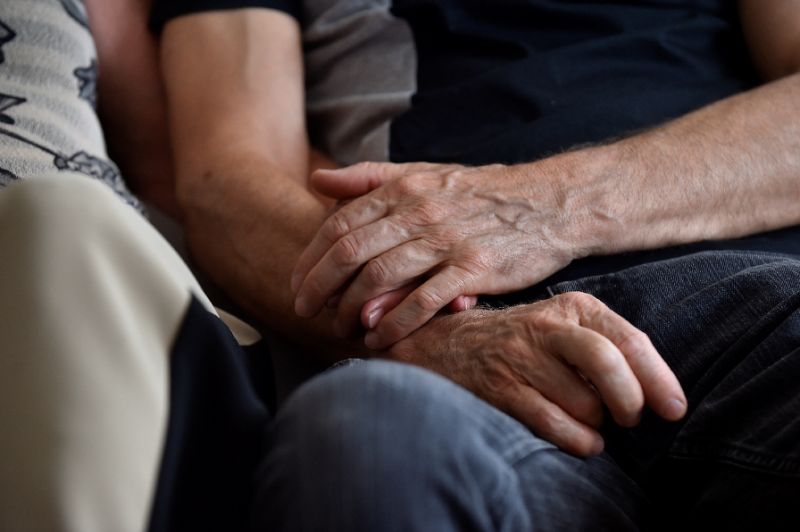
(File Photo)
Dutch authorities are prosecuting a doctor for euthanizing an elderly woman with dementia in the first case of its kind since the practice was legalized in 2002, officials said Friday.
According to AFP, the female doctor, who was not named, allegedly put a sleep-inducing drug into the 74-year-old woman's coffee and had to ask her family to hold her down when she began to struggle when the euthanasia drug was being injected.
Prosecutors accused the doctor "overstepped the mark" - as she could not have unambiguously come to the conclusion with the nursing home patient, who had written a will saying she wanted to die but did not clearly say so at the time of her death.
Limits to offering euthanasia
Five years earlier, she signed a living will saying that she wanted euthanasia if she was competent in her mind at the time of its execution. She had later given differing statements about her desire for euthanasia, prosecutors said, and her mental health had deteriorated by the time of her death.
Medical paperwork showed that the patient often exhibited signs of fear and anger and would wander around the building at night, because of which the nursing home's senior doctor claimed that she could confirm that the time was now right for the euthanasia to go ahea.
Investigators found that even though the woman was suffering intolerably and there were no further treatment options, two key prerequisites mentioned in Dutch euthanasia law were absent. They said the doctor had acted carelessly by not asking the patient explicitly if she agreed with euthanasia.
"The doctor should have checked with the woman whether she still had a death wish by discussing this with her”, a statement from the public prosecution department said. “The doctor had not acted in accordance with the legal standards”.
Euthanasia is legal in the Netherlands under strict conditions, which requiring patients must be suffering unbearable pain and the doctor must be convinced the patient is making an informed choice. The opinion of a second doctor is also demanded.
The medical complaints board ruled: “Given the irreversibility of ending a life and the ethical aspects linked to consciously ending the life of a fellow human being, a written euthanasia declaration should not leave any doubt for interpretation."
"This is murder for the convenience of the family", a netizen named Anna commented on the case," This is the danger of euthanasia. The doctor and family should be fully prosecuted. And if the country insists on keeping this law, it should be tightened so that these types of situations do not occur."
The Netherlands is a trailblazer when it comes to legal suicides. However, legally and morally performing euthanasia on people with severe Parkinson or dementia remains a grey area, and the validity of a declaration signed before when they are incapable of making their current feelings known remains in question.
A trend out of control
The Netherlands became the first country in the world to legalize so-called mercy killing in 2002. It was believed to have the best-regulated voluntary euthanasia system in the world. Supporters see the expansion of the law as moral progress, while opponents predict it is moving towards a society reminiscent of Nazi Germany, where those deemed “useless” are being cleared out.
In 2017, 6,585 people chose euthanasia in the Netherlands, about 4.4 percent of the total number of more than 150,000 registered deaths in the country, of which 166 involved people with dementia, according to the Regional Euthanasia Review Committee.
Euthanasia is also legal in Canada, Colombia and Luxembourg. Switzerland, Germany and six US states, which only allow euthanasia for physically terminal patients, while the Netherlands and neighboring Belgium extend the limitations to dementia sufferers, according to Penney Lewis, co-director of the Centre of Medical Law and Ethics at King's College London.
Of the 10,000 Dutch patients with dementia who die each year, roughly half of them will have had an advance euthanasia directive. And even though the law says it’s legal, almost no doctor is willing to perform euthanasia on patients with severe dementia, since such patients are no longer mentally capable of making a “well-considered request” to die.
Some physicians said it is problematic to kill people with late-stage dementia because it’s hard to know what their wishes truly are.
Dr. Wolpe, an Emory University bioethicist, said he was “generally supportive” of people’s right to choose their own death, but that he was troubled by some trends in the Netherlands, including the extension of euthanasia to people who were not suffering physically.
“When you switch from purely physiological criteria to a set of psychological criteria, you are opening the door to abuse and error,” he said.
Experts called for a higher criteria for euthanasia considering the characteristics of mental illness, and respect of the individual's will, as well as more detailed clauses on relevant legislation to protect the rights of patients and doctors.
(With input from the Guardian)


